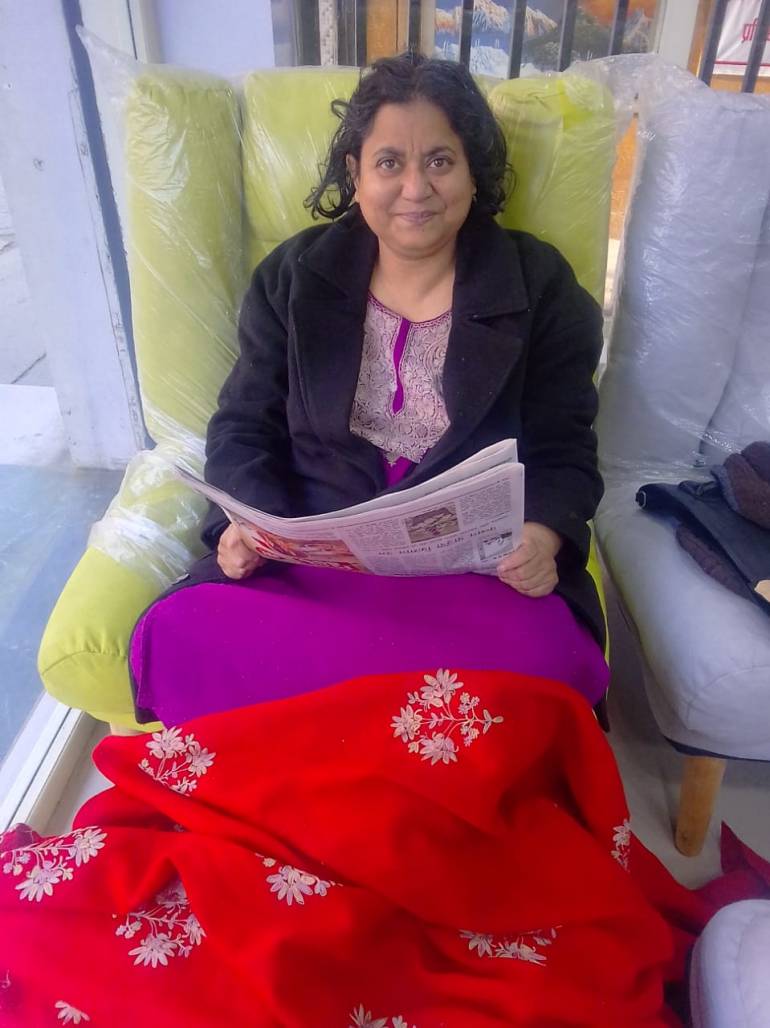Indian woman promotes “diplomacy journalism” between India and Nepal

An Indian woman is promoting “diplomacy journalism” between India and Nepal—two neighboring countries –to foster peace and cultural exchange.
“As next-door neighbors, India and Nepal are close friends from time immemorial. We have all points of friendship in common. Treaties are there between the two countries so that we can carry on our friendly relations further,” Indrani Dasgupta, a freelance journalist and editor of “Darjeeling Today”, told RVA News.
In 2022, she founded “Darjeeling Today,” a monthly publication. Its continuous effort is to strengthen Indo Nepal relations.
Darjeeling Today is a candid effort and its crucial role has helped India and Nepal to sign bilateral agreements between the two countries in April and May 2022.
She is publishing Darjeeling Today on peacebuilding in the region.
The magazine covers news of Darjeeling and various issues affecting the countries, says Indrani, who hails from West Bengal.
Darjeeling is the northernmost district of the state of West Bengal in eastern India in the foothills of the Himalayas. It is also the border of Nepal, which is a landlocked country in South Asia. Nepal is mainly situated in the Himalayas.
“Darjeeling Today”, a research-based magazine, helps in settling practical issues.
On April 2, 2020, Indrani interviewed the then Foreign Minister of Nepal and the chief party spokesperson of the Communist Party of Nepal (Unified Marxist–Leninist) Pradeep Kumar Gyawali, who vividly described the age-old sufferings of Nepal.
“Darjeeling Today” pursued these points with the Government of India from 2021, Indrani says.
“Government of India has appreciated Indrani as Enterprising Editor,” she says.
Contributing articles to Times of India and Roshni, Delhi-based All India Women's Conference mouthpiece, she got opportunities at the federal level.
Under her leadership, the Unique Identification Authority of India (UIDAI) Bengali website has been formulated.
Indrani has obtained a master’s degree in Political Science and has done a certificate course in Journalism and Indology.
“I started my career in print media in the late 1990s, with an interview with noted Indian writer and social activist Mahasweta Devi (1926–2016),” she adds.
Indrani has published some of her journalistic works in “Bartaman Patrika,” an Indian Bengali daily newspaper published in Kolkata, West Bengal.
At the end of her teenage, she edited a few books of women writers under the aegis of Jadavpur University, Women's Study Centre.
Her book “Smell of Gun Powder” was published by Patras Publication Kolkata.
As an active member of the All India Women's Conference, a non-governmental organization based in Delhi, India, she got a national opening where her work has been widely read and appreciated by the readers at the national level.
In those days, she came in close touch with Tara Gandhi, the granddaughter of Mahatma Gandhi, National Father of India, and an ambassador of peace.
Later, she joined “The Herald,” a tabloid-size Catholic weekly of the Archdiocese of Calcutta.
Under the editorship of the Herald, Father Francis S. Rosario, she ushered in a new era in Bengali Herald and also simultaneously contributed to English Herald.
During her stint with The Herald, she would extensively report on the Bengali community and interview bishops of West Bengal, diocesan priests of Calcutta Archdiocese, and other dignitaries during Mother Teresa's birth centenary in 2010.
These were her two significant milestone achievements as a reporter and junior editor.
When she was with a federal government project in India, she did a few important contributions like writing the slogan of “Pradhan Mantri Jan-Dhan Yojana” which is a federal government scheme in India to provide easy access to financial services.
Indrani also contributed Bengali short stories in “Dainik Statesman,” the Bengali version of the Statesman, and other Bengali magazines like “Cholar Pothe” and “Angana.”
She has published quality literary articles in the Indian Society for Cultural Co-operation and Friendship (ISCUF), an organization in India promoting people-to-people cultural understanding and friendship.
ISCUF is the mouthpiece of Indo Soviet cultural association.
Indrani also worked in association with the Women's Study Centre, Jadavpur University, Calcutta.
“God has sent us to this world to materialize His plan. As long as God wishes to engage me to promote love and friendship with Nepal, I shall have to act accordingly,” she says.
“Since our articles are research-based, we accept ourselves as disciples of peace. We love peace. We wish for a peaceful society and with a peaceful mind,” Indrani adds.
Joining The Herald was also the blessing of Mother Teresa.
“When I was with the Herald, I started to understand the presence of Jesus in my work. Soon, I realized that souls of prayer are souls of silence,” she adds.
“Our present-day crisis is that we are spiritually poor. Human beings create economic poverty. If we enrich our souls, we can erase economic poverty also,” Indrani adds.
Besides journalism, Indrani loves nature. “I love greeneries, mountains, and rivers without which I cannot live,” she adds.
“I am a good nurse also who can cure critical patients and expand their longevity,” Indrani adds.
More importantly, Indrani says, “People who show deep respect for women, and appreciate their work worldwide are the men of God and our soul mates.”
Radio Veritas Asia (RVA), a media platform of the Catholic Church, aims to share Christ. RVA started in 1969 as a continental Catholic radio station to serve Asian countries in their respective local language, thus earning the tag “the Voice of Asian Christianity.” Responding to the emerging context, RVA embraced media platforms to connect with the global Asian audience via its 21 language websites and various social media platforms.
















- Reply
Permalink